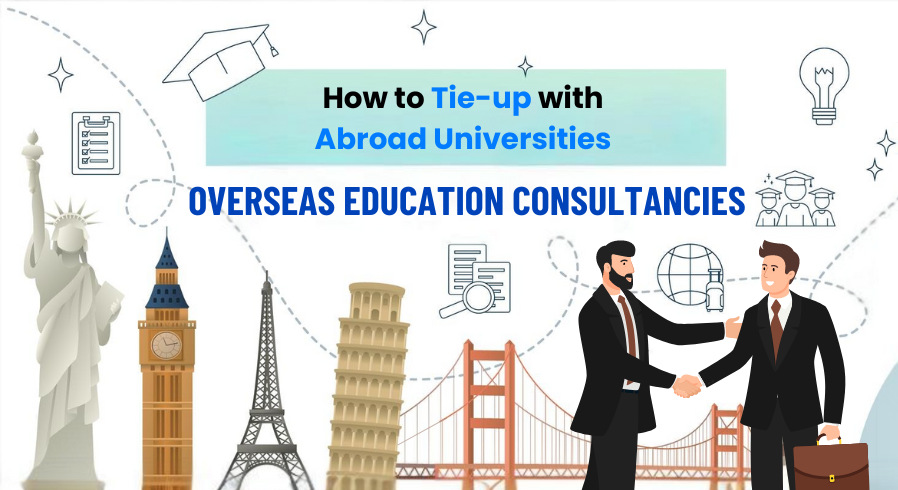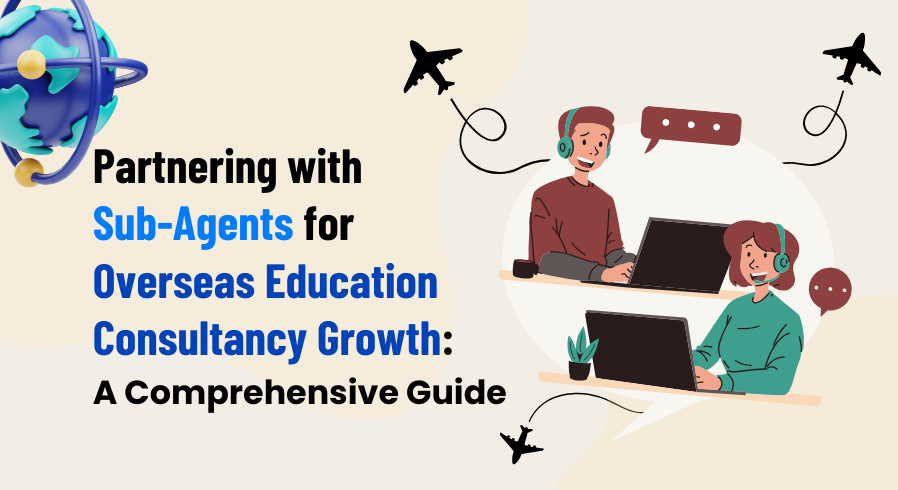Table of Contents

Entrepreneurship in the field of study abroad business offers an exceptional chance to enable students to pursue their vision of global learning while creating a lucrative business venture. As international learning experience increases in demand, students are turning to consultants who can advise them on university admissions, visa processing, housing, and acculturation. By providing professional guidance and individual attention, you can establish a business that not only satisfies these demands but also influences students' lives seeking education abroad in a positive way. This guide provides major steps to successfully start and develop your own study abroad consultancy.
1. Research the Market and Define Your Niche
Explore in-depth the new study destinations, like Scandinavia, Asia, or even unconventional nations, where competition is less intense and opportunities for students are increasing. These countries could provide low tuition, rich cultures, and developing education systems. For instance, Scandinavia (Sweden, Denmark, Norway) provides high-quality education, usually in English, and several universities offer low-cost or no-tuition education to foreign students.
- Emerging Countries: Destinations for study abroad such as South Korea, Singapore, or Taiwan are increasing in popularity because of their quality education, affordability, and welcoming student environments. Emerging countries tend to have fewer agencies marketing them, which provides you with a competitive advantage in these countries.
- Personalized Services: Target specific groups or special areas of study that are not well-served. For instance, target students from a specific nation (e.g., Indian students) looking to pursue education in Europe or North America. Also, providing specialized courses such as STEM (Science, Technology, Engineering, and Mathematics) courses or arts and humanities courses can differentiate you.
- Market Analysis: Consistently monitor trends within the study abroad market, including student preference shifts, regional policy changes, and new areas of study. Remain in advance of the market by modifying your services to accommodate the changing needs of the student body.
2. Develop a Business Plan
Besides the typical components of a business plan, add a student journey map section. This will break down all the touchpoints from the first inquiry to after graduation, with a clear blueprint for students. Having a personalized experience is central to establishing good customer relationships.
- Journey Mapping: Map the whole student journey that your business will provide when a student interacts with you, from the first inquiry (website visitation, social media) to the submission of their application, processing of their visa, settling abroad, and even after. Touch on student needs at each stage — whether it's financial support assistance before departure, or employment search guidance on return.
- Personalized Services: Tailoring the student experience is a revolution in study abroad consulting. For instance, once the student has gone through the application process, give them post-arrival advice such as opening a bank account or arranging housing.
- Unambiguous Objectives: Establish the goals of your enterprise with clear key performance indicators (KPIs), for example, the number of students placed in certain nations, number of services increased, or level of customer satisfaction.
3. Legal Requirements and Business Structure
Transparency and compliance with the law are crucial in establishing trust in the study abroad sector. Set clear policies for every part of your business, particularly when dealing with student information, money, and foreign laws.
- Transparency: Clearly outline the services, charges, and possible risks involved in the study abroad experience. This builds credibility and trust among students and university partners.
- Legal Compliance: Familiarize yourself with the education laws of your native country and your partner nations, particularly regarding student visas, academic accreditation, and data protection (compliance with GDPR for European clients, as an example). Maintain business practices consistent with these laws to guarantee smooth and legal business operation.
- Business Structure: Select the proper business structure for your operations (sole proprietorship, limited liability company, partnership). Get advice from a legal professional to make sure you are complying with the proper regulations for cross-border operations.
4. Establish Relationships with Institutions
Special Angle: Rather than simply being an intermediary between students and universities, position yourself as a student ambassador for the universities you represent. By becoming a trusted representative of these institutions, you'll be able to provide students with the most up-to-date, accurate information about scholarships, entry requirements, and programs.
- Direct Communication: Build strong connections with foreign universities so that you're always in the know about admission requirements, program changes, and fresh scholarships. This keeps your students informed in a timely and accurate manner, helping them gain a competitive edge.
- Exclusive Benefits: Negotiate for special scholarships or priority admissions for students you refer to partner schools. These collaborations can set your business apart and attract more interested students.
- Long-Term Partnership: Build sustained relationships with institutions to make your agency relevant. Attend education fairs or virtual webinars organized by universities and invite them to partner with you on marketing and student recruitment activities.
5. Establish a Professional Website
A professional website is not merely a brochure — it needs to be a resource center for students. Add virtual tours of cooperating universities, quotes from successful students, and interactive guides that assist users in navigating the study abroad experience.
- Virtual Campus Tours: Provide virtual campus tours of universities, which will provide potential students with a clearer understanding of life at the university. This facility can prove to be particularly useful for students who are apprehensive about studying abroad because of distance.
- Multilingual Website: Since you might be dealing with international students, having a multilingual website is a must. This will allow you to provide for students who come from different linguistic backgrounds and make your institution more inclusive.
- Student Resources: Feature blog entries, guides, and downloadable resources (e.g., visa checklists, application deadlines) that are useful, applicable information for students planning to study abroad.
6. Establish a Strong Online Presence
Take advantage of visual storytelling by utilizing sites such as Instagram or YouTube to highlight the stories of students studying abroad currently or who have already finished their programs. This will assist in creating authenticity and credibility with your audience.
- Live Q&A Sessions: Host live Q&A sessions on Facebook or Instagram to interact directly with potential students. You can respond to questions regarding the application process, the most suitable study destinations, and the life of a student abroad.
- Webinars and Tutorials: Host webinars that walk students through the study abroad process. These can include visa applications, accommodation, cultural integration, and so on.
- Student Stories: Feature actual stories and testimonials of students who've had successful enrollments in study abroad programs via your agency. Prospective clients would be able to relate and place more trust on your services then.
7. Provide a Range of Services
Differentiate from typical university application assistance by providing tailor-made study packages that encompass internships, language immersion, and cultural orientation.
- Internships: Provide students with the option to apply for internships in the country where they're studying. This enhances the value of the traditional study abroad experience and exposes students to international work environments in a practical way.
- Language Immersion: Engage language schools or programs based on immersion either prior to or concurrent with university study. This may assist in enhancing the students' language capability prior to enrolling in academic environments.
- Career Counseling: Offer career guidance and employment placement to students in the host nation. This can facilitate students' procurement of part-time jobs while enrolled and full-time employment upon graduation.
8. Establish Partnerships with Test Preparation Centers
Unique Angle: Form exclusive alliances with test preparation providers providing discounted or complimentary courses for tests such as TOEFL, IELTS, or GRE. This brings tremendous value to your students and enhances their readiness for studying abroad.
- Discounted Packages: Provide packages wherein students receive access to discounted or complimentary preparation courses upon enrolling for your study abroad services.
- Comprehensive Test Prep: Aside from the general exam prep, provide specialized courses for students seeking competitive universities or scholarship programs. Offer these according to the needs of top universities.
9. Attention to Marketing and Branding
Create an emotional-marketing approach by building a narrative-based marketing framework that focuses on student success stories. Utilize blogs, podcasts, and video content to develop emotional experiences with your target market.
- Content Marketing: Leverage blog posts to teach students about the study abroad experience, give them tips on application, and guide them for living abroad. SEO-optimized articles will also send organic traffic to your site.
- Podcasts and Interviews: Produce podcasts where students narrate their study abroad experience. This human element creates a relationship with potential clients and allows them to visualize their own experience.
- Social Media Campaigns: Launch targeted campaigns highlighting your brand's core values, student recommendations, and success stories.
10. Offer Visa and Immigration Assistance
Offer step-by-step visa guidance that breaks down the paperwork and legalities in simple, understandable terms for students. Additionally, stay updated on the ever-changing immigration policies and provide consultations for students facing complicated visa issues.
- Visa Consultation: Offer personalized consultation services to ensure students complete the visa application process accurately. This can include mock interviews, document verification, and detailed step-by-step guides.
- Policy Updates: Regularly update your clients about visa and immigration policy changes to keep them informed and avoid last-minute complications.
11. Provide Accommodation and Travel Assistance
Partner with local housing providers to offer exclusive accommodation options. Provide students with a variety of housing choices, from dorms to shared apartments, and assist with travel planning to ensure a smooth arrival process.
- Group Travel Packages: Offer group travel packages where students can book flights and accommodations together, lowering costs and fostering a sense of community.
- Local Partnerships: Collaborate with trusted housing providers in different countries to provide exclusive student accommodations that suit their budgets and preferences.
12. Recruit and Train a Knowledgeable Team
Hire staff members who have firsthand experience studying abroad. Their personal insights into cultural challenges and academic demands make them empathetic advisors who can guide students through the process with understanding and authenticity.
- Cultural Sensitivity Training: Provide training for your team to ensure they can address the diverse needs of international students from different cultural backgrounds.
- Ongoing Development: Offer your staff continuous education and professional development opportunities to keep them updated on new programs, student concerns, and the global education landscape.
12. Set Up a Financial System (Payment Processing, Invoicing)
Offer multi-currency payment options to accommodate international clients. Integrate modern payment platforms like PayPal, Stripe, or regional payment systems for seamless transactions.
- Automated Invoicing: Use tools that automatically generate invoices and receipts to streamline your accounting. This saves time and helps ensure accurate tracking of payments.
- Payment Flexibility: Allow clients to pay in installments or offer package deals with transparent pricing.
13. Install a Financial System (Payment Processing, Invoicing)
Provide multi-currency payment solutions to support global customers. Incorporate contemporary payment gateways such as PayPal, Stripe, or local payment gateways for smooth transactions.
- Automated Invoicing: Utilize automated invoice and receipt generation tools to simplify your accounting. This is time-saving and ensures proper payment tracking.
- Payment Flexibility: Let customers pay in installments or provide package prices with clear prices.
14. Be Current with Study Abroad Policy and Trends
Be a regular presence at international education conferences, in the know with regard to changes in policy, and monitor burgeoning trends in study destinations, programs, and visa reforms. You can then plan ahead and provide early-bird information to your students.
- Networking in the Industry: Network with educational institutions, government agencies, and other players in the industry to keep current with future change in immigration or education policy.
- Emerging Destinations: Find the countries that are becoming increasingly popular destinations for studying abroad and offer pre-trend analysis to students looking at these places.
These innovative strategies will distinguish your study abroad consultancy from the rest and position your business as a credible and cutting-edge ally for students in pursuit of higher education overseas.
Conclusion
Starting a study abroad business has tremendous potential for expansion and influence in the global education industry. By targeting niche markets, customizing services to meet students' requirements, and anticipating trends, you can establish a distinct and viable business that assists students in their educational venture overseas.
From conducting thorough market research and developing a solid business plan to building strong relationships with educational institutions and offering personalized support services, each step plays a crucial role in establishing a successful study abroad consultancy. Leveraging digital tools, providing continuous support, and staying informed about legal and immigration changes will further enhance your ability to serve your clients effectively.
Ultimately, success in this field depends on your ability to connect with students, provide valuable resources, and be a trusted guide throughout their entire study abroad experience. By consistently offering high-quality services, building a credible brand, and fostering long-term relationships, your study abroad business can thrive in an ever-evolving market.









